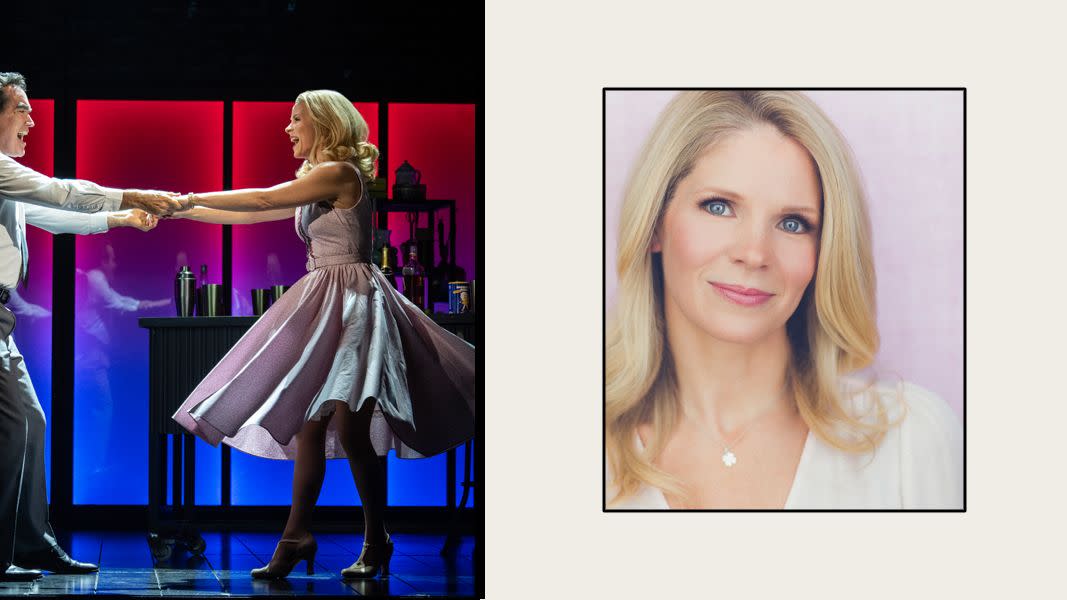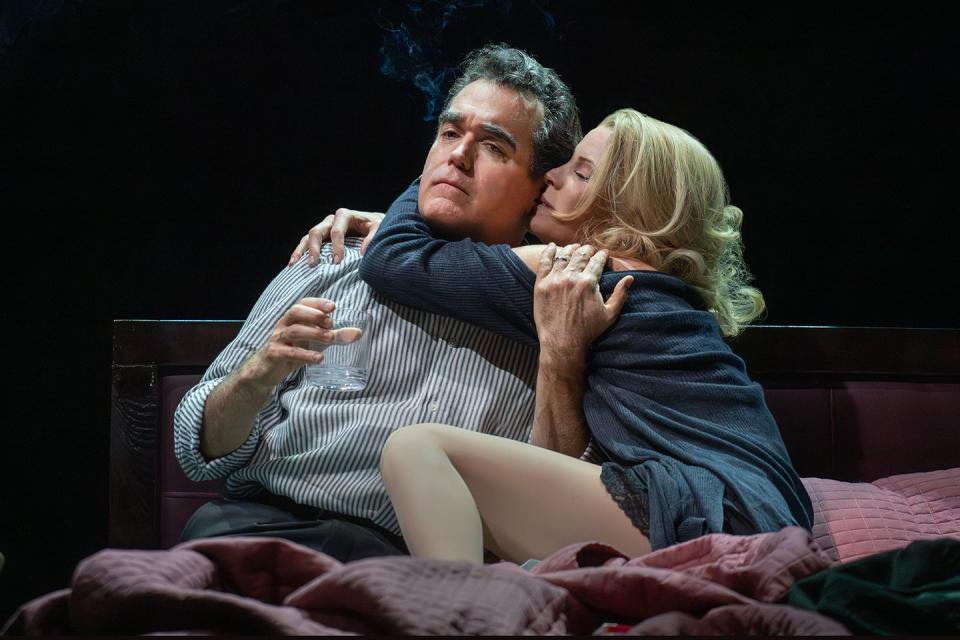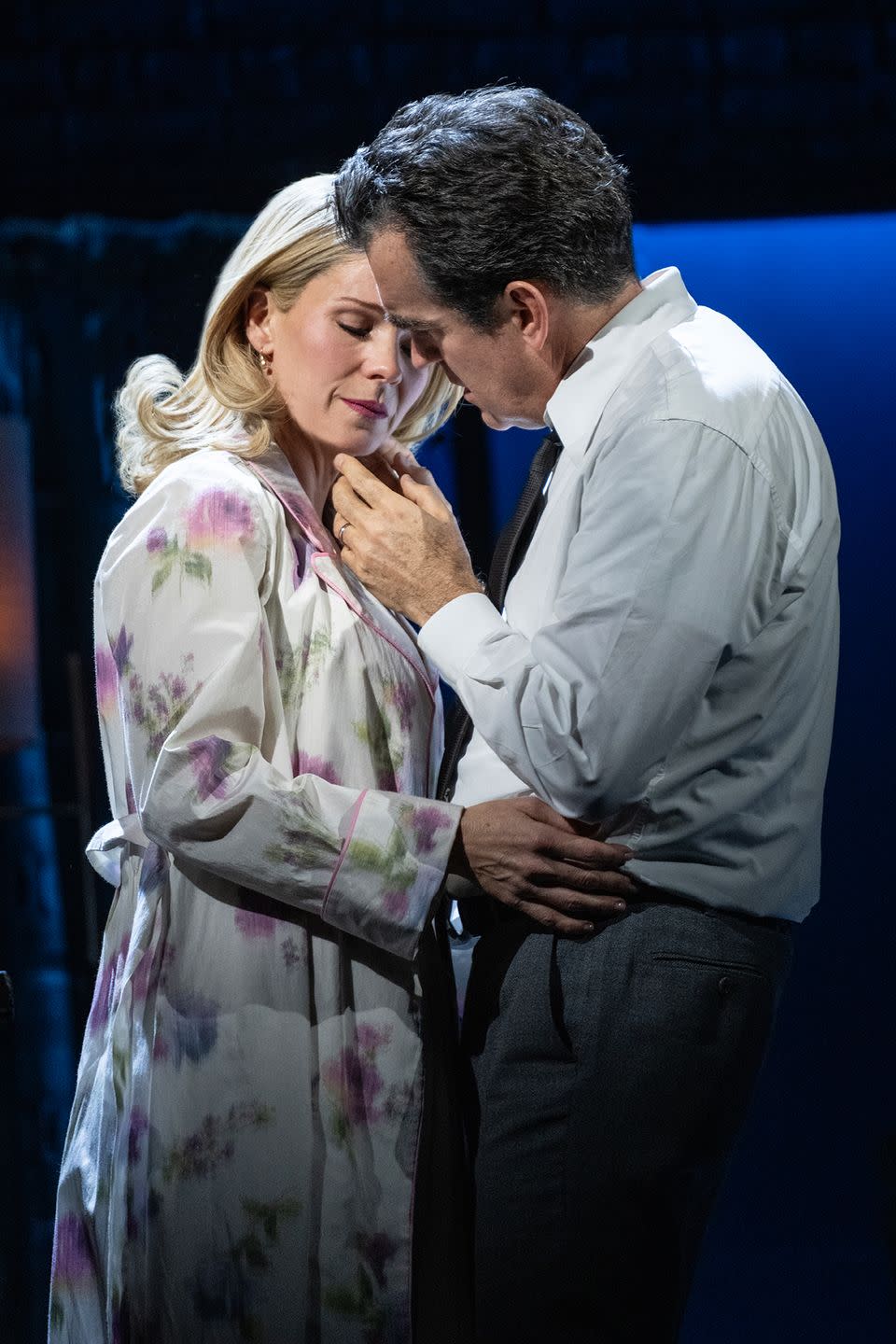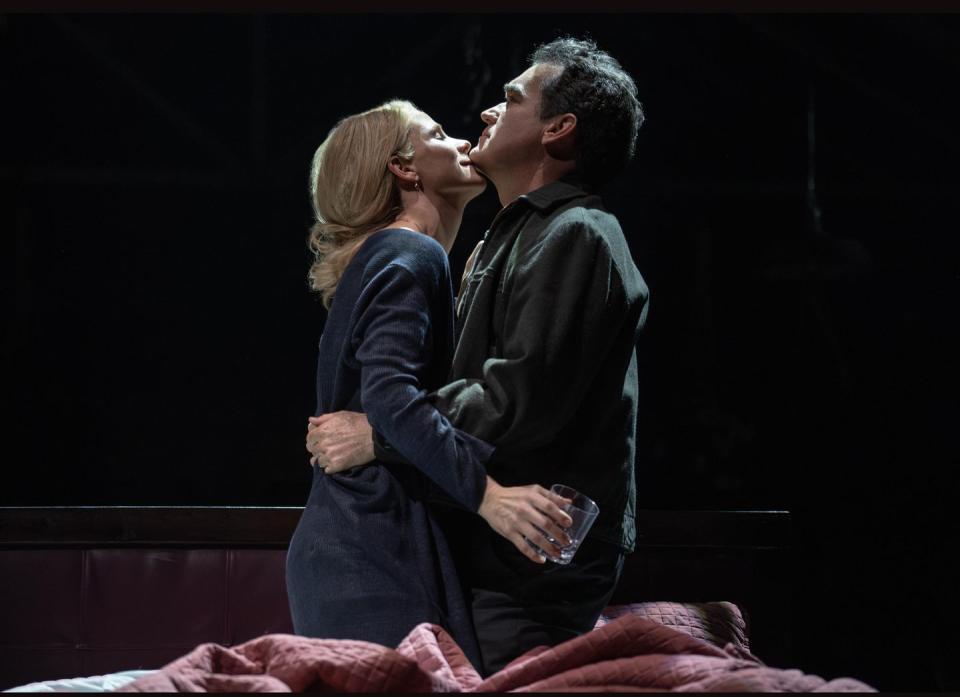Kelli O’Hara Challenges You to Put Your Phone Away and Feel

- Oops!Something went wrong.Please try again later.

Places, please for ELLE’s monthly column Showstoppers, where theater’s biggest stars reflect upon the moment in their career where the famous phrase “the show must go on” became a little too real. When things don’t go according to plan onstage, here’s how the pros react—and what they take away from it.
To kick off the new year, Tony-winner Kelli O’Hara, who currently stars as Kirsten Arnesen in Days of Wine and Roses, details a hand-crushing injury while playing Lilli Vanessi/Katharine in the 2019 Broadway revival of Kiss Me Kate. Here, in her own words, she shares how that experience shows the perseverance of the industry, and how the theater is one of the only places where we can truly feel.
I think of little things like accidents on stage or injuries where they happen, but you keep singing. There was one show in Kiss Me Kate when I slammed my finger in the door. It was plywood, so it bent, and when I came back from slamming the door, my hand didn’t come with me and my finger was closed in the door. I didn’t feel it until later, when my finger blew up and my nail fell off, the whole thing.
But I remember thinking, ‘Well, I can’t get my hand and my finger’s in the door.’ I then remember saying, “Little help, I need a little help.” And two people, including Will Chase, who was my costar, ran out and bent the door and dislodged my hand. I remember in that moment, I sort of stopped the show, but should I stop it? I turned around, and I took a breath, and Paul Gemignani, the conductor, had his baton raised and I started to sing. He was exactly in time with me. The band was in, and we finished the song and there were people out in the audience that didn’t even notice.
That’s what you have to remember. You think it’s the biggest thing in the world, and some people just don’t even notice. They think it’s part of the show. If you remember it that way, then you think, “I need to keep going, because I’m going to take people out of the story if I don’t keep going.”

I think we’ve prepared to give you an experience, and we’re also on that train riding it. We want to have the experience ourselves, and it’s the shared adventure together. If we just stop it in its tracks, it’s like the bubble is pierced. You come out of the fantasy that we’re all in. It’s sort of delicious to me as an artist that we’re all taking each other on a journey. The show must go on. The reason we say that is because we don’t want to spoil it for anybody, even for ourselves. So, you grin and bear it and you deal with it later, I suppose. I mean, that’s the way I think about it.

Now, we definitely had shows stop because someone in the audience is truly sick or something’s happening. I’ve been in all those shows, and they’re great stories to tell after, but that’s kind of the joy of it. Nowhere else in our lives can we kind of put the real world aside and live inside, dedicate ourselves to living inside this moment for a few hours with each other. We’re sort of sharing this present.
I think that’s what theater will never stop doing. It’ll be the place where we can go if we’re brave enough to actually feel. Even if it’s a hard subject, at least you can feel something. I think we have to do that. I don’t ever want to be numb. [Days of Wine and Roses] is about being numb and the problems with being numb: numbing yourself with alcohol, numbing yourself with social media, numbing yourself with whatever it is. It doesn’t necessarily serve us.
[Theater is] this opportunity we give each other if we all dedicate ourselves to it, to being together for just this tiny bit of time. If we do that, then the experience is that much greater. It’s hard for all of us to do, but I think we really need it. We really need to remind ourselves what it means to actually feel.

Talkback
On the history of Days of Wine and Roses:
“I brought the idea of this project to Adam Guettel 21 years ago. I had been working with Brian d'Arcy James on the Sweet Smell of Success on Broadway. We closed in June that year, and I went out to Sundance to do the first workshop of The Light in the Piazza. It was the very beginning of my career, and I loved working with Brian. So, when Sweet Smell of Success closed, I was trying to think of something that would be fitting for the two of us. I knew the movie [of Days of Wine and Roses]. I wanted to play something that was a different type of thing than an ingenue girl. I wanted to have some more substance. I wanted to go into something more challenging, that asked more of my craft, and here we are.”
On her role in The Gilded Age and how performing for television is different from the stage:
“I’ve enjoyed every second of it. I love the cast and the crew, and I’m thrilled we’re getting a third season because that wasn’t necessarily in the cards. It’s been a great surprise that season 2 has gone so well and we have such good support. The people I'm working with are all my theater heroes. I mean, come on. It’s an embarrassment of riches every time I'm on set sitting there.
“I kind of put some thought to it some time ago about the difference between truth in a whisper and truth in a yell. It’s all truth. So, when your audience is three centimeters from your face, there's no need to yell. [On television,] the story and the truth and the authenticity of character is just the same as theater, but you just want to make sure that it's clear. I think of them as being very similar at their core, but the technique is just different because of the size of the room.”
On finding roles that fit her voice:
“One of the things that I've looked for in my life is to find scores that fit me. It’s one of the reasons I asked Adam [Guettel] to write again for me. The Light in the Piazza was finding that quasi-opera-musical-theater crossover musical where I could actually do Broadway but sing in the way that my voice wants to sing.
“The Golden Age of sopranos, sort of classic musical theater, was what I grew up learning to sing, and I thought that’s the way I would be able to make my living. For the large part, it wasn’t. Jekyll and Hyde and South Pacific and The Pajama Game and all those things where I started my career, I thought, ‘Gosh, I hope I can get back to this sort of more classical version of theater singing.’
“Jason Robert Brown did for The Bridges of Madison County, but I had to sort of ask for those things. I had to say, “Do you think you could make that a higher note? Do you think that you could keep that soprano way rather than belt-y?” Even in some of the roles that I did that were belt-y, I changed keys. I’ve had to sort of stretch into things and make them fit. Luckily, I’ve been able to do that. I think it's a good lesson for people that things can actually come to fit for you if you ask and if you ask in the right ways. You have to really believe in what it is that you do, as opposed to always trying to fit in another box.”
On portraying alcohol use in Days of Wine and Roses:
“Every single person that walks this earth has an arm’s length relationship to alcohol, whether it be themselves, their mom, their dad, their child, their sister, brother and friend. There’s no representing the whole, that would be an absolute impossibility. I think Brian and I had to go into this with our own human connection, our own bodies. It’s oftentimes you have your own secrets and your own journeys and connections that you don’t necessarily need to talk about and how you find things. One of the things I know very deeply is that the both of us need to be meditatively free in order to do it. We haven’t necessarily talked about this, but I know neither of us ever wanted to do something that was a caricature of what we think it means to be drunk, because being drunk is funny and it can be extremely painful at the same time. You can’t disrespect what that sort of thing does to people, if they’re a codependent child of that or if they’re the person themselves. We just needed to be human about it, and the only way to do that was to just have our own personal portrayal and journey in that.”
On roles for women on Broadway:
“There’s a certain type of role that has been since the beginning of time written for young women, and there’s a certain type of role since the beginning of time that are written for older women. I wanted to change that up a bit. I don’t want every older female role to be bitter and jaded or sarcastic. I want there to be levels of that. I also want there to be love and I want there to be joy. I want there to be new adventures. I also want there to be real life challenges that might be surprising because I think a bunch of the same gets really old.
“I think as women get older, we’re looking to tell realistic and human stories, not just the competitive one where you’re looking back at a younger woman and feeling jealous or the one where you’re always angry at a man. There’s a lot of things we can play.
“We feel a lot of different things, and the content is changing, and that’s really exciting. Playing this particular role [in Days of Wine and Roses], I realized I don't need the woman I play to be the hero.”
This interview has been edited and condensed for clarity.
Kelli O'Hara currently stars as Kirsten Arnesen in Days of Wine and Roses at Studio 54. Tickets can be purchased here.
You Might Also Like

